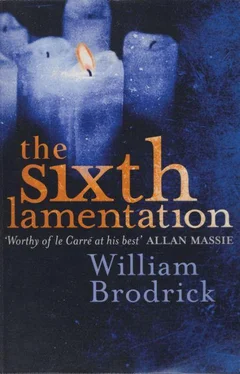William Brodrick - The Sixth Lamentation
Здесь есть возможность читать онлайн «William Brodrick - The Sixth Lamentation» весь текст электронной книги совершенно бесплатно (целиком полную версию без сокращений). В некоторых случаях можно слушать аудио, скачать через торрент в формате fb2 и присутствует краткое содержание. Жанр: Триллер, на английском языке. Описание произведения, (предисловие) а так же отзывы посетителей доступны на портале библиотеки ЛибКат.
- Название:The Sixth Lamentation
- Автор:
- Жанр:
- Год:неизвестен
- ISBN:нет данных
- Рейтинг книги:5 / 5. Голосов: 1
-
Избранное:Добавить в избранное
- Отзывы:
-
Ваша оценка:
- 100
- 1
- 2
- 3
- 4
- 5
The Sixth Lamentation: краткое содержание, описание и аннотация
Предлагаем к чтению аннотацию, описание, краткое содержание или предисловие (зависит от того, что написал сам автор книги «The Sixth Lamentation»). Если вы не нашли необходимую информацию о книге — напишите в комментариях, мы постараемся отыскать её.
The Sixth Lamentation — читать онлайн бесплатно полную книгу (весь текст) целиком
Ниже представлен текст книги, разбитый по страницам. Система сохранения места последней прочитанной страницы, позволяет с удобством читать онлайн бесплатно книгу «The Sixth Lamentation», без необходимости каждый раз заново искать на чём Вы остановились. Поставьте закладку, и сможете в любой момент перейти на страницу, на которой закончили чтение.
Интервал:
Закладка:
‘Haven’t we met before?’
‘Yes. I used to be at the Bar. I’m sure we had a few courtroom squabbles. I moved on.’
He laughed and said, ‘Well, you did the right thing. Wish I’d become a monk: He slumped in the back of an unmarked car and slammed the door.
DI Armstrong seemed to hesitate. She glanced around as if not wanting to leave and said, ‘This is a lovely place. Goodnight, Father.’
Anselm returned to the parlour to join Father Andrew and Brother Wilfred. Brother Sylvester had shuffled into the room and was laying out a selection of leaflets on the sideboard. He said:
‘When Wilf told that chap sanctuary had been abolished, he said he’d done it before.’ He continued arranging neat piles of pink and green paper.
‘What?’ said Father Andrew quietly
‘After Wilf left to find Anselm, he said he’d done it before, a long time ago.
The Priory bell rang ponderously, slow, deep chimes echoing around Larkwood, calling the brothers to prayer. Sylvester turned obediently to get himself ready — ‘I’m off. Don’t want to be late.’ — and slipped out of the room, leaving the other monks to digest the implications of his words.
‘I’m glad he kept that to himself,’ said the Prior judiciously
So was Anselm. He was thinking ahead, catching sight of a shifting shadow ‘Why here? Why come to us?’
‘Good question,’ said the Prior pensively The ringing had come to a close. A busy shuffling of feet came from the cloister. ‘Come on. Time for quiet.’
Anselm entered the long dark nave and found his place in the choir. Sylvester’s space behind him was empty. He would, as usual, be late. Leaning against his stall and leafing through his Psalter, Anselm smiled to himself about the Prior — his sally about Clement III and the remand home remark. Father Andrew always listened carefully to everyone with whom he spoke, and used what he heard at some future point as if it was fresh to his mind. Like the Lord, he reaped a harvest from fields he had not sown. He mulled over how it was that the Prior was so sure the police had informed the Press, and had done so in order to force Larkwood to keep their guest. Someone, of course, must have told him.
Chapter Four
1
It was the stone in his shoe, lodged inadvertently when Anselm visited Larkwood Priory on a school retreat at the age of eighteen. He only signed up to avoid yet another geography trip, plodding in the rain over that wretched limestone pavement near Malbam Tarn. But an extravagant claim on a vocations leaflet caught his eye (laid on a table by a monk who said he’d met Baden-Powell):
‘We can’t promise happiness, But if God has called you to be here
You will taste a peace this world cannot give.’
Throughout the years that followed, the words slunk into his mind and out again — not when he was restless but when he was content. The contingent pledge became a goad, an unwanted invitation that reminded him of what he most wanted to forget.
The loss of peace — for that is what it was — had trodden an unknown path. When beset by the dogmatic turbulence of adolescence Anselm turned to Proust. Seeing his life in epic form, he subjected his past to a minute psychological investigation. He easily identified the events that had sent ripples into the present: the death of his mother whom he had hardly known; the nineteenth-century formality of his father; the paradoxical but defining insecurity that arises from being wedged between two older brothers and two younger sisters; the welcome nuance of banishment to a French boarding school for part of his secondary education. Anselm concluded that he, alone among men, was in grave need of internal repair.
When he joined the chambers of Roderick Kemble QC, fondly known as Roddy, and had a few run-ins with some of the more difficult members of the profession, he learned that he wasn’t in that bad a shape after all. Roddy was a red, round and joyous man, loved and bled over profusely by all who knew him. While he was one of the most outstanding advocates of his generation it was compassion that truly set him apart. His one theme of consolation was habitually volunteered when drunk: ‘None of us get here without being broken to pieces along the way, old son. None of us know why So let’s just bear with one another.’ And, lunging for a bottle, he would say, ‘Now, bring on the fatted calf.’
The dislocation that beset Anselm in his maturity, however, was of a wholly different order and could only be assuaged by long periods of solitude and… prayer: an activity that took him beyond himself, but which collapsed the moment he thought about what he was doing — like falling off a bicycle. And, picking himself up again, he remembered those frightful words on the leaflet. He began to wonder, on a purely theoretical basis, whether for some people (but not him) monastic life was the only way of finding contentment.
He went back to Larkwood out of curiosity, attending an occasional Office and having tea in the village. He visited the Priory more often, dreading the return to London, but without wanting to stay in Suffolk. On the fateful day he met the tourist at the Court of Appeal, Anselm recognised that in brushing against this other life he had sustained a fine wound on the memory, causing a longing, a homesickness that would not let him settle in any place other than the source of injury. And so, Anselm began his return to Larkwood. After two years of visiting, and being politely discouraged (in accordance with The Rule), he became a postulant. He left behind a baffled family He was thirty-four.
Anselm’s first surprise on entering religious life was to discover the monastery contained ordinary human beings alarmingly similar to one or two villains he had represented at the criminal Bar. He had thought only the prison system could withstand the outrageous behaviour of its members. But the same was true of Larkwood, where, unlike enforced incarceration, each individual had promised to live a life of ongoing conversion. Thankfully, Brother Bruno performed an important act of mercy on the day of Anselm’s arrival. He briskly punctured whatever reasonable expectations Anselm might have entertained about a life of wholesome tranquillity.
Bruno had been a Tyneside docker for thirty years and brought to monastic life a playful candour that generated various maxims — most of which were only quoted to be discounted. ‘I think there’s something you ought to know,’ he confided, having been introduced to Anselm five minutes earlier. ‘You’ll find out as you go along, the good guys always leave and only the so and sos remain.’
Time passed with a peculiar swiftness known only to those who live subject to the rhythm of monastic life. The chant, the ancient regularity and the silence mysteriously brought together the fragments of Anselm’s past and gave him a sense of completeness — but only for the first few months. That turned out to be a glimpse of who he might become, rather than who he was. Within a year the pieces shattered again, falling back to where they had been before he’d become a postulant. He understood what agnostic Roddy had told him when he’d left the Bar: that being a monk had nothing to do with putting the bits back together. And he learned the meaning of another Bruno aphorism: ‘Nobody stays for the reasons they came: The liturgical cycle rolled up the years. Some very pleasant chaps returned to the world. But Anselm stayed put, abandoning any pretence of being one of the good guys, or of searching for peace through internal reconstruction. And sometimes, in that half-sleep savoured last thing at night and first thing in the morning, Anselm began to wonder how much of it had been choice, and how much unwitting cooperation.
Читать дальшеИнтервал:
Закладка:
Похожие книги на «The Sixth Lamentation»
Представляем Вашему вниманию похожие книги на «The Sixth Lamentation» списком для выбора. Мы отобрали схожую по названию и смыслу литературу в надежде предоставить читателям больше вариантов отыскать новые, интересные, ещё непрочитанные произведения.
Обсуждение, отзывы о книге «The Sixth Lamentation» и просто собственные мнения читателей. Оставьте ваши комментарии, напишите, что Вы думаете о произведении, его смысле или главных героях. Укажите что конкретно понравилось, а что нет, и почему Вы так считаете.












